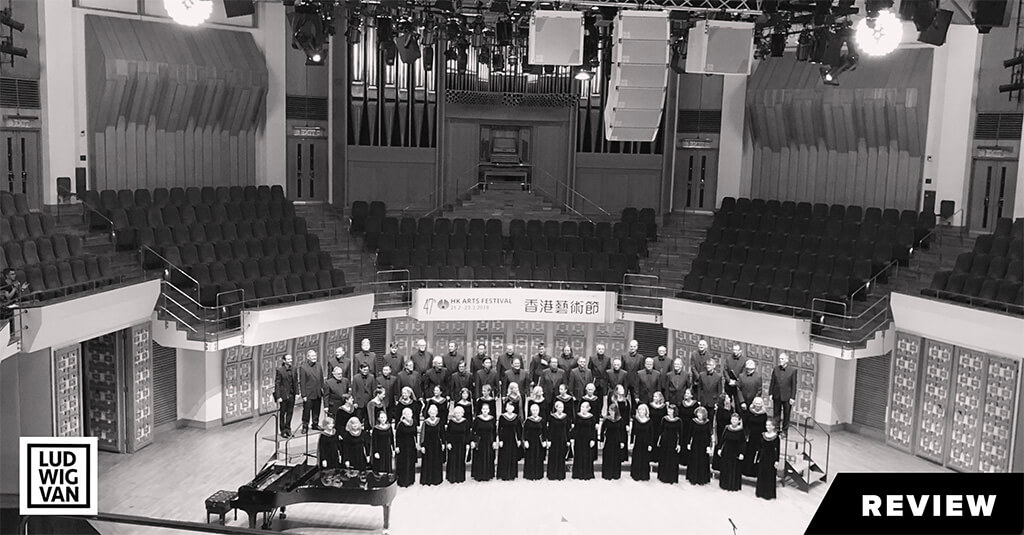
Chor der Oper Leipzig In Concert: Selections from Nabucco, Die Zauberflöte, Carmen, Eugene Onegin, Lohengrin, Der fliegende Holländer, Faust, Macbeth, Die Meistersinger von Nürnberg, Der Freischütz. Thomas Eitler-de Lint, Chorusmaster; Alexander Stessin, piano. Concert Hall, Hong Kong Cultural Centre, March 3, 2019.
The centrepiece of the visit of Oper Leipzig to the 2019 Hong Kong Arts Festival (HKAF) was undoubtedly Calixto Bieito’s controversial production of Wagner’s Tannhauser, which I recently reviewed. That said, not to be forgotten was the concert featuring the excellent Chor der Oper Leipzig, on March 3. It took place in the acoustically wonderful, theatre-in-the-round Concert Hall, adjacent to the Grand Theatre.
The concert hall was sold out. If it doesn’t look that way in the photo, it’s because the seats behind the chorus were not put up for sale, the right decision, given that the sound there would be much diminished. The HKAF audience got a chance to really hear what the superb Leipzig Opera Chorus could do, front and centre, in a program full of choral chestnuts.
These 70 men and women are the unsung heroes and heroines of the Company. They continue a lineage that is nearly 202 years old, as the Chor der Oper Leipzig celebrated its bicentennial in November 2017. That makes it even older than the cross-town “rival,” the Gewandhauschor that’s part of the legendary Gewandhausorchester, which is merely 150 years old! I write that with my tongue firmly planted in my cheek…
The evening opened with “Gli arredi festivi” from Nabucco, one of two well known choral pieces from the Verdi opera, the other being “Va. pensiero.” “Gli arredi” is a rousing piece, showing off the power and volume of the 70-strong chorus. They produced a big sound, but never forced or harsh. This was followed by the subtler “O Isis und Osiris” from Die Zauberflöte. All male voices, and they achieved an enviable homogeneity of sound found only in the best choruses.
Interestingly, two members of the chorus stepped forward to serve as co-MCs of the evening — American mezzo Reba Evans, a new member, and Chinese-American tenor Michael Chu, a veteran in his 26th season with Chor Leipzig. Engaging and charming, they introduced the pieces, but also spoke about their personal experiences of what it’s like living and working in Germany as foreigners, adding a nice human interest touch to the evening.
Lots of highlights — in my book, their best work of the evening were the Wagner pieces. “Treulich geführt” from Lohengrin was lovely, as were the two selections from Act Three Die Meistersinger. No wonder, Leipzig being the birthplace of Wagner, his works are front and centre every season. A piece like Lohengrin’s Wedding March they probably can sing in their sleep! Also outstanding was the Sailors’ chorus from Der fiegende Holländer, delivered with the requisite energy and authority.
While the pianist Alexander Stessin did a terrific job, I won’t pretend that I didn’t miss the orchestra. When it comes to opera choruses, nothing can replace an orchestra to make the necessary aural and dramatic impact. With piano accompaniment, it comes across as sounding like a rehearsal, frankly. This being a stand-and-sing evening, it was weird to see the ladies, a few of them are, shall I say, of a certain age, dressed in formal concert attire, trying to sound coquettish in the Cigarette Girls’ Chorus from Carmen! Without the staging, something is missing.
There were a few surprises. In the Chorus of Gypsies from La Traviata, a couple of choristers contributed a duet, nicely sung. The only work in the program totally unfamiliar to me was something called Parodie auf eine Opernszene, “Insalata Italiana” by Austrian librettist/composer Richard Genée (1823-1895). Sung a capella, this funny piece allowed the chorus to ham it up for laughs, and the audience faithfully lapped it all up, never mind it’s a bit corny and cheesy.
Three encores were given. The first was the previously mentioned “Va, pensiero,” at one time the unofficial Italian national anthem, and practically an obligatory item for an opera chorus concert. Then something sounding vaguely Asian was given. It took me much intense listening to figure out they were singing in Mandarin! Very nice of the Leipzig Chorus to take the trouble of learning a Chinese piece phonetically, despite the less than idiomatic Mandarin diction!
The third encore was the finale from Die Fledermaus. Here the chorus really let its collective hair down. Three ladies came forward to sing Rosalinda, Adele, and Orlofsky. My concert companions were less than thrilled with the solo singing, but I won’t repeat the adjectives used. Yes, they are choristers, not soloists. But they sang musically, even if they got slightly carried away, in their chance to be front and centre. And they were having fun — the finale was even encored. Not the last word in mellifluous vocal production, but it was from the heart. That’s good enough for me.
LUDWIG VAN TORONTO
Want more updates on classical music news and reviews? Follow us on Facebook or Twitter for all the latest.
- SCRUTINY | Opera Atelier’s All Is Love Makes Triumphal Return - April 15, 2024
- SCRUTINY | From The Heart: Ema Nikolovska And Charles Richard-Hamelin Offer Unique Program At Koerner Hall - March 26, 2024
- SCRUTINY | The Glenn Gould School Spring Opera Presents A Superb Dialogues Des Carmélites - March 22, 2024



